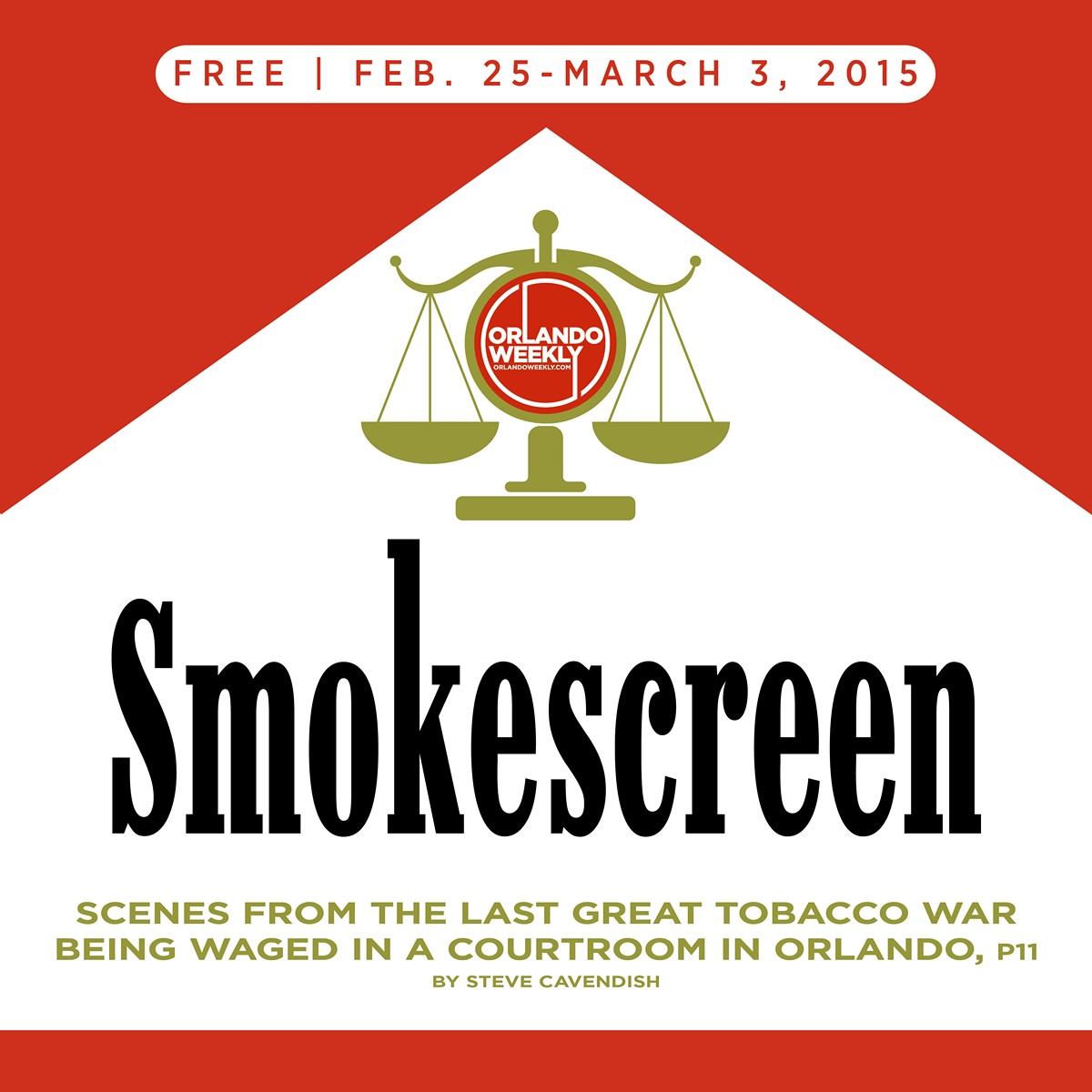Grunberg reads the passage. "I feel badly about my own lack of intelligence gathering in this situation, but I don't think the questions I now raise are academic. The lawyers remind us, I'm told, that the entire matter of addiction is the most potent weapon a prosecuting attorney can have in a lung cancer/cigarette case. We can't defend continued smoking as free choice if the person was addicted."
Now the defense must undo the damage from Byrd's expert. Although Reynolds is named first in the suit, Philip Morris takes the lead – Kerrivan smoked more Marlboros, a Philip Morris product, than anything else. Byrd says that in Judith Berger's case the previous month, Reynolds attorneys had been very aggressive, objecting at every turn. That may have turned off the jury.
If so, Stan Davis, the lead attorney for Philip Morris, is the antidote to that. Smooth but firm in his delivery, Davis objects rarely. He is graying and mustachioed, and his deep voice and calm demeanor have a Sam Elliott quality – he'd be right at home playing a sheriff. He has the reputation of being one of the best litigators at Shook, Hardy & Bacon, Philip Morris' longtime law firm.
Right off, Davis asks if he's testifying in a lot of these cases. Yes, Grunberg says. A few since 2011, a few more in the next year.
"So personally, if you had your way, would cigarettes be banned?"
"No, I would not do that," Grunberg says.
"At all?"
"Not pulled off the market. It's that I believe nicotine, per se, should be removed from cigarettes, and that product could still be sold as cigarettes based on flavors and likes that people would choose, but not have the addictive drug."
Davis then pulls up testimony from a 2010 trial where Grunberg agreed, on the witness stand, to a question whether companies should "pull them all off the market."
It's a little thing, but Davis will try every way he can to chip away at Grunberg: He's biased; he wants to ban cigarettes; there have been warnings for years; popular literature, like Readers Digest, had anti-smoking articles since the early 1930s; Kenny Kerrivan could have quit anytime he wanted. Davis even quotes Grunberg's mentor and boss, former Surgeon General C. Everett Koop, implying that smoking is only a matter of choice.
For four and a half hours over two days, Davis uses even the smallest contradiction between depositions given before the trial and Grunberg's testimony to impeach the witness. When Byrd gets a chance to rebut, he counters by attacking the main thrust of Davis' questioning: We've always known smoking was bad – why should today's companies be liable?
"There have been ideas, essays, rumors on both sides of this debate over hundreds of years, and even as recently to that report as I mentioned yesterday," Grunberg says. What there wasn't, until relatively recently, was scientific evidence. In the early 1980s, he explains, the National Institute on Drug Abuse was still stating that it didn't know if smoking and nicotine were addictive, and even his former boss Koop called for further evaluation.
"So the surgeon general didn't know. The National Institute on Drug Abuse didn't know," Grunberg says. "Basically, just because there are opinion papers and selective editorials over the last century, which ended up being correct, the scientific evidence had not been accumulated. So the surgeon general and the federal government could not inform the people."
Byrd needs to establish that cigarette companies conspired to mask the harmful effects of their product. On the trial's fifth day, he calls to the stand Robert Proctor, whose reputation precedes him as a kind of Kremlinologist of Big Tobacco. In the 1990s, millions of pages of internal tobacco-company files became public domain. So many documents came out, in fact, that they became a field of academic study. Few know more about it than Proctor, a professor of science history at Stanford.
On the stand, Proctor gives what amounts to a history of the modern cigarette as stealth weapon. In 1900, he says, cigarettes were relatively unpopular, with slightly more than 2 billion smoked in the U.S. By 1982, that number had skyrocketed to 630 billion. In large part, he explains, that was due to shrewd mass marketing in the early 20th century that "crushed" early anti-tobacco sentiment. The industry would spend $250 billion (in 2006 dollars) from the 1940s until the 2000s marketing its product. In 1950, the average American saw 50 hours of continuous cigarette advertising per year.
For many decades – including those when Kenny Kerrivan got hooked on cigarettes – it was the most advertised product on television, radio and billboards. Americans saw tobacco branding everywhere, from sporting events to movies like Superman II, where Philip Morris paid for multiple placements. Reynolds bought the rights to a French cartoon character; suddenly kids had a new buddy in Joe Camel. Proctor says the phallic-nosed character was so successful that it took the brand from 1 percent of the 12-to-17 market to more than 30 percent.
Yet visuals are no less crucial to Byrd's case. In the newest courtrooms everything is wired: Individual screens flicker on and off right in the jury box. Byrd spends hours with Proctor walking the court through an array of documents and graphs. The exhibits, and in particular the use of video, are not only instructive but engaging.
They have to be. For even the most committed person, being a juror can be an exercise in tedium as you sit in the same chair for days on end. Some jurors doze off in the middle of testimony that both parties are spending hundreds of thousands of dollars to contest in court. Whenever something is shown on their screens, though, the jurors sit up and focus on their monitors.



















